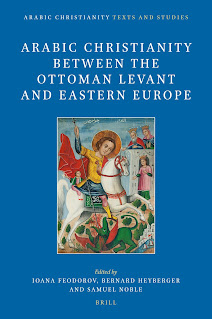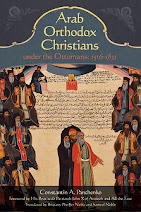Arabic original here.
Love in Condescension
According to Christian theology, the event of Christ's ascension into heaven and sitting at the right hand of God the Father constitutes a link in the chain that inevitably extends from the Son of God becoming human and taking a body, to His crucifixion and resurrection, to His ascension into heaven and His sending the Holy Spirit into the world. The purpose of all these events is the opening of the New Covenant that God Himself initiated, so that man may have eternal life in God's presence.
This New Covenant was founded on a set of divine condescensions required by God's infinite love of humankind. The Son of God's becoming human is nothing other than a condescension that He undertook in order to share in man's created nature.
The Son of God's suffering, crucifixion and death is nothing but another condescension... And with regard to this, the Apostle Paul said, "Christ Jesus, being in the form of God, did not consider it robbery to be equal with God, but made Himself of no reputation, taking the form of a bondservant, and coming in the likeness of men. And being found in appearance as a man, He humbled Himself and became obedient to the point of death, even the death of the cross" (Philippians 2:6-8).
In all the events that took place around Him, Christ demonstrated great humility, to the point of being crushed. He could have been born in a palace, but He preferred a miserable manger. He could have been born a king, instead of being born "a servant". He could have crucified people, but instead He desired that He Himself be the one crucified. He could have been "forceful, terrible" [cf. Surat Maryam 32] instead of being led like a lamb to the slaughter... He chose for Himself the ultimate condescension. He chose to love and to sacrifice Himself to redeem humankind from sin and death.
Divine condescension reached its apex with Christ's ascension into heaven. Heaven, here, is not a place in outer space. Rather, it symbolizes God's presence. Through His ascension, Christ desired to honor man by calling him to abide with Him forever. He says, "In My Father’s house are many mansions; if it were not so, I would have told you. I go to prepare a place for you. And if I go and prepare a place for you, I will come again and receive you to Myself; that where I am, there you may be also" (John 14:2-3). The purpose of the ascension is to erase the boundary that divides heaven and earth, so that man may be of the house of God.
Yes, divine condescension reached its apex with Christ's ascension and His sitting at the right hand of God the Father, since Christ brought human nature with Him and honored man by causing him to sit at the right hand of God in the most high places. Thanks to Christ, human nature is present in God Himself.
Thanks to Him, God embraced human nature and caused it to dwell in Him. With regard to this, the Apostle Paul addresses the people of Ephesus with the words, " when we were dead in trespasses, God made us alive together with Christ (by grace you have been saved), and raised us up together, and made us sit together in the heavenly places in Christ Jesus" (Ephesians 2:5-6).
It is a cause for astonishment that after the disciples witnessed Christ's ascension to heaven, at a time when they should have been sorrowful over their Teacher departing from them, "they returned to Jerusalem with great joy" (Luke 24:52).
They rejoiced because they were certain that His generosity is boundless and that the one who generously gave Himself on the cross will not be stingy with them in their abiding with Him in the kingdom.
Love in Condescension
According to Christian theology, the event of Christ's ascension into heaven and sitting at the right hand of God the Father constitutes a link in the chain that inevitably extends from the Son of God becoming human and taking a body, to His crucifixion and resurrection, to His ascension into heaven and His sending the Holy Spirit into the world. The purpose of all these events is the opening of the New Covenant that God Himself initiated, so that man may have eternal life in God's presence.
This New Covenant was founded on a set of divine condescensions required by God's infinite love of humankind. The Son of God's becoming human is nothing other than a condescension that He undertook in order to share in man's created nature.
The Son of God's suffering, crucifixion and death is nothing but another condescension... And with regard to this, the Apostle Paul said, "Christ Jesus, being in the form of God, did not consider it robbery to be equal with God, but made Himself of no reputation, taking the form of a bondservant, and coming in the likeness of men. And being found in appearance as a man, He humbled Himself and became obedient to the point of death, even the death of the cross" (Philippians 2:6-8).
In all the events that took place around Him, Christ demonstrated great humility, to the point of being crushed. He could have been born in a palace, but He preferred a miserable manger. He could have been born a king, instead of being born "a servant". He could have crucified people, but instead He desired that He Himself be the one crucified. He could have been "forceful, terrible" [cf. Surat Maryam 32] instead of being led like a lamb to the slaughter... He chose for Himself the ultimate condescension. He chose to love and to sacrifice Himself to redeem humankind from sin and death.
Divine condescension reached its apex with Christ's ascension into heaven. Heaven, here, is not a place in outer space. Rather, it symbolizes God's presence. Through His ascension, Christ desired to honor man by calling him to abide with Him forever. He says, "In My Father’s house are many mansions; if it were not so, I would have told you. I go to prepare a place for you. And if I go and prepare a place for you, I will come again and receive you to Myself; that where I am, there you may be also" (John 14:2-3). The purpose of the ascension is to erase the boundary that divides heaven and earth, so that man may be of the house of God.
Yes, divine condescension reached its apex with Christ's ascension and His sitting at the right hand of God the Father, since Christ brought human nature with Him and honored man by causing him to sit at the right hand of God in the most high places. Thanks to Christ, human nature is present in God Himself.
Thanks to Him, God embraced human nature and caused it to dwell in Him. With regard to this, the Apostle Paul addresses the people of Ephesus with the words, " when we were dead in trespasses, God made us alive together with Christ (by grace you have been saved), and raised us up together, and made us sit together in the heavenly places in Christ Jesus" (Ephesians 2:5-6).
It is a cause for astonishment that after the disciples witnessed Christ's ascension to heaven, at a time when they should have been sorrowful over their Teacher departing from them, "they returned to Jerusalem with great joy" (Luke 24:52).
They rejoiced because they were certain that His generosity is boundless and that the one who generously gave Himself on the cross will not be stingy with them in their abiding with Him in the kingdom.







